Stop-Loss
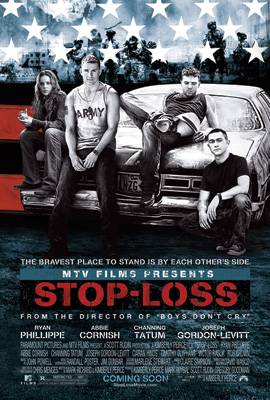
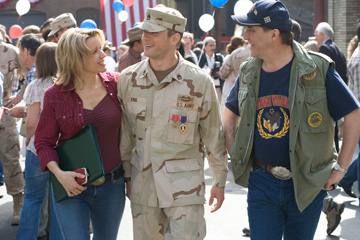 Stop-Loss is a movie that focuses on a lot of things, but doesn't focus enough on any of the issues it looks at. It's a movie about the war, it's a movie about soldiers coming home, it's a road trip movie, it's about failed relationships, it's about how hard it can be for a soldier to return to civilian life after spending so much time on the battlefield, it's about whether it's right or not if a soldier should go AWOL...I can picture a lot of these issues making a compelling movie, but the screenplay by Peirce and Mark Richard treat them as if they're pit stops on a highway. It's content to give us the bare essentials, then move on. The title stems from a military term that means a soldier is forced back into duty even though his or her time is up. That's what happens when Texas native, Brandon King (Ryan Phillippe), returns home. He's looking forward to getting back to a normal life now that his tour of duty is over, but he gets a nasty surprise when he finds out he's been stop-lost and will be heading back to Iraq at the end of the month. In a scene of great implausibility, he marches right over to his lieutenant colonel, and tells him to "f--- the President" when he finds out there's no way out of this forced return to duty. Brandon is then escorted out of the office by a pair of fellow soldiers, but he's just so angry, he punches them out, steals a jeep, and drives right off the base with no problem whatsoever.
Stop-Loss is a movie that focuses on a lot of things, but doesn't focus enough on any of the issues it looks at. It's a movie about the war, it's a movie about soldiers coming home, it's a road trip movie, it's about failed relationships, it's about how hard it can be for a soldier to return to civilian life after spending so much time on the battlefield, it's about whether it's right or not if a soldier should go AWOL...I can picture a lot of these issues making a compelling movie, but the screenplay by Peirce and Mark Richard treat them as if they're pit stops on a highway. It's content to give us the bare essentials, then move on. The title stems from a military term that means a soldier is forced back into duty even though his or her time is up. That's what happens when Texas native, Brandon King (Ryan Phillippe), returns home. He's looking forward to getting back to a normal life now that his tour of duty is over, but he gets a nasty surprise when he finds out he's been stop-lost and will be heading back to Iraq at the end of the month. In a scene of great implausibility, he marches right over to his lieutenant colonel, and tells him to "f--- the President" when he finds out there's no way out of this forced return to duty. Brandon is then escorted out of the office by a pair of fellow soldiers, but he's just so angry, he punches them out, steals a jeep, and drives right off the base with no problem whatsoever.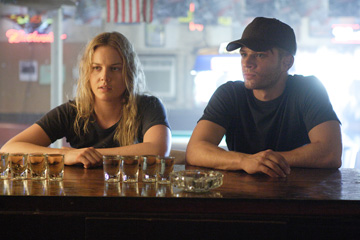 Despite these brief flights of absurd fantasy, Stop-Loss takes itself pretty seriously. The rest of the film deals with Brandon on the run with a friend named Michelle (Abbie Cornish), who is engaged to another soldier named Steve (Channing Tatum from Step Up and She's the Man). Steve is still loyal to the military, and wonders what Brandon is doing deserting his duty. Most of all, he wonders why his fiance is helping him. I was wondering too. The movie notes in its dialogue that Michelle and Brandon have long been friends, but the movie doesn't really go much deeper into their relationship than that. First, Brandon and Michelle plan to drive to Washington D.C., and seek the help of a Senator who told Brandon he'd help him out if he ever needed it during his return ceremony. When that falls through, it looks like Brandon may have to cross the border. This lengthy mid-section with the two on the run is when the movie starts spinning its wheels. Not much happens while they're on the road, and some of their experiences, such as when Brandon has a violent run-in with some petty street crooks, seem somewhat forced and contrived. Worst of all, we never feel a real connection with any of the characters. Brandon seems less a real person, and rather a tool of the screenplay to represent its message. We learn little about him, so there's never as strong of a relationship between the audience and the character as there should be.
Despite these brief flights of absurd fantasy, Stop-Loss takes itself pretty seriously. The rest of the film deals with Brandon on the run with a friend named Michelle (Abbie Cornish), who is engaged to another soldier named Steve (Channing Tatum from Step Up and She's the Man). Steve is still loyal to the military, and wonders what Brandon is doing deserting his duty. Most of all, he wonders why his fiance is helping him. I was wondering too. The movie notes in its dialogue that Michelle and Brandon have long been friends, but the movie doesn't really go much deeper into their relationship than that. First, Brandon and Michelle plan to drive to Washington D.C., and seek the help of a Senator who told Brandon he'd help him out if he ever needed it during his return ceremony. When that falls through, it looks like Brandon may have to cross the border. This lengthy mid-section with the two on the run is when the movie starts spinning its wheels. Not much happens while they're on the road, and some of their experiences, such as when Brandon has a violent run-in with some petty street crooks, seem somewhat forced and contrived. Worst of all, we never feel a real connection with any of the characters. Brandon seems less a real person, and rather a tool of the screenplay to represent its message. We learn little about him, so there's never as strong of a relationship between the audience and the character as there should be.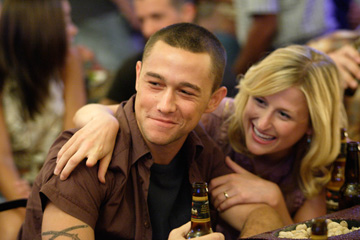 The movie routinely interrupts Brandon's story with the story of Steve and another soldier named Tommy (Joseph Gordon-Levitt) back in Texas. These characters are supposed to represent the ones who can't quite stop being soldiers, even when they're civilians. Steve can't see himself as being anything but a soldier, and seems to see Brandon going AWOL as a personal insult. Tommy, on the other hand, can't seem to handle life outside the military. Almost as soon as he's home, his relationship with the girl he was to marry falls apart, he turns to the bottle, and he spends his days shooting what were supposed to be wedding gifts, and breaking windows in drunken rages. The character of Tommy follows a predictable path that we can see coming from early on. Anyone paying attention should be able to figure out where his character will be when the end credits roll. The movie hits upon some interesting ideas for both of these subplots, but they're never developed as anything more than ideas. It doesn't dig deep enough to make them into real people, and their stories almost seem to be breezed over. (Steve's fiance leaving him seems to happen in less than five hours after him coming home from the war, with no real explanation given.)
The movie routinely interrupts Brandon's story with the story of Steve and another soldier named Tommy (Joseph Gordon-Levitt) back in Texas. These characters are supposed to represent the ones who can't quite stop being soldiers, even when they're civilians. Steve can't see himself as being anything but a soldier, and seems to see Brandon going AWOL as a personal insult. Tommy, on the other hand, can't seem to handle life outside the military. Almost as soon as he's home, his relationship with the girl he was to marry falls apart, he turns to the bottle, and he spends his days shooting what were supposed to be wedding gifts, and breaking windows in drunken rages. The character of Tommy follows a predictable path that we can see coming from early on. Anyone paying attention should be able to figure out where his character will be when the end credits roll. The movie hits upon some interesting ideas for both of these subplots, but they're never developed as anything more than ideas. It doesn't dig deep enough to make them into real people, and their stories almost seem to be breezed over. (Steve's fiance leaving him seems to happen in less than five hours after him coming home from the war, with no real explanation given.)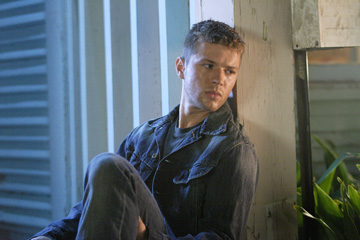 What's frustrating is that there was obviously a lot of effort put into the film. The performances by all the leads are strong, and are only brought down by the fact that their characters aren't as fleshed out as they should be. The movie also hits upon some truthful moments in its dialogue. Apparently, director Peirce spent a lot of time researching and interviewing different military people about their war experiences, and it comes through in the raw and sometimes honest dialogue. The movie also has some individual scenes that work, such as when Brandon visits the family of a fallen friend while he is on the run, and another scene where he visits a wounded ally at a hospital. If the movie as a whole was more sure footed and had more of a center focus, they could have been even more effective. As it is, they come across as highlights in a movie that seems to meander along, hitting upon a good scene now and then. I wanted this movie to captivate and thrill me, but it just never seemed to get off the ground.
What's frustrating is that there was obviously a lot of effort put into the film. The performances by all the leads are strong, and are only brought down by the fact that their characters aren't as fleshed out as they should be. The movie also hits upon some truthful moments in its dialogue. Apparently, director Peirce spent a lot of time researching and interviewing different military people about their war experiences, and it comes through in the raw and sometimes honest dialogue. The movie also has some individual scenes that work, such as when Brandon visits the family of a fallen friend while he is on the run, and another scene where he visits a wounded ally at a hospital. If the movie as a whole was more sure footed and had more of a center focus, they could have been even more effective. As it is, they come across as highlights in a movie that seems to meander along, hitting upon a good scene now and then. I wanted this movie to captivate and thrill me, but it just never seemed to get off the ground.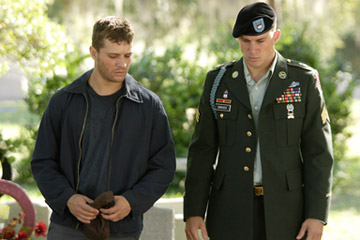
See the movie times in your area or buy the DVD at Amazon.com!






0 Comments:
Post a Comment
<< Home